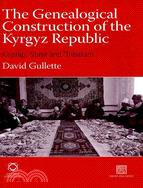The Genealogical Construction of the Kyrgyz Republic ─ Kinship, State and 'Tribalism'
商品資訊
ISBN13:9781906876104
出版社:Global Oriental
作者:David Gullette
出版日:2010/05/30
裝訂/頁數:精裝/219頁
規格:22.2cm*14.6cm*2.5cm (高/寬/厚)
定價
:NT$ 6264 元若需訂購本書,請電洽客服 02-25006600[分機130、131]。
商品簡介
作者簡介
商品簡介
In this important new study on the peoples of the Kyrgyz Republic (Kyrgyzstan), David Gullette exposes significant misconceptions that have hitherto shaped Western understanding about the role of kinship in Kyrgyz society and offers new insights into notions of relatedness.
Since independence in 1991, allegations of `tribalism' have raised concerns in the West that `tribal' divisions had re-emerged and were obstructing the development of democracy. The chaos of the 2005 `Tulip Revolution' seemingly confirmed this. Through detailed research, however, Gullette demonstrates that there were no `tribal' divisions as such; instead, there were numerous self-seeking networks fixated on achieving personal goals. Moreover, he finds that perceptions of former nomadic societies had been conditioned by tsarist, Soviet and Western kinship studies based on an evolutionary view of society.
In a paradigmatic shift, Gullette analyses how people's exploration of genealogy serves to establish relatedness between groups and individuals through shared memories of ancestors, but not to define social structure. His examination of personal accounts of honouring ancestors and fulfilling family obligations reveals how moral values are transmitted through generalogies and how social relations are maintained to receive help through family networks.
History, which shapes memories, became the vehicle for a national campaign through which former President Askar Akaev adapted these relations to create an ethnic and state ideology of unity. By introducing and exploiting national celebrations, the former president not only advanced the ideals of the republic, but also introduced elements of self-discipline. Gullette utilizes genealogy to explore the contexts in which these celebrations were conducted and the value placed on them for the Akaev regime's longevity.
Students of anthropology, international relations and political science, as well as those interested in regional studies, will welcome the solid analytical and theoretical structure of this book.
Since independence in 1991, allegations of `tribalism' have raised concerns in the West that `tribal' divisions had re-emerged and were obstructing the development of democracy. The chaos of the 2005 `Tulip Revolution' seemingly confirmed this. Through detailed research, however, Gullette demonstrates that there were no `tribal' divisions as such; instead, there were numerous self-seeking networks fixated on achieving personal goals. Moreover, he finds that perceptions of former nomadic societies had been conditioned by tsarist, Soviet and Western kinship studies based on an evolutionary view of society.
In a paradigmatic shift, Gullette analyses how people's exploration of genealogy serves to establish relatedness between groups and individuals through shared memories of ancestors, but not to define social structure. His examination of personal accounts of honouring ancestors and fulfilling family obligations reveals how moral values are transmitted through generalogies and how social relations are maintained to receive help through family networks.
History, which shapes memories, became the vehicle for a national campaign through which former President Askar Akaev adapted these relations to create an ethnic and state ideology of unity. By introducing and exploiting national celebrations, the former president not only advanced the ideals of the republic, but also introduced elements of self-discipline. Gullette utilizes genealogy to explore the contexts in which these celebrations were conducted and the value placed on them for the Akaev regime's longevity.
Students of anthropology, international relations and political science, as well as those interested in regional studies, will welcome the solid analytical and theoretical structure of this book.
作者簡介
David Gullette is a social anthropologist and expert on Central Asia. He is an Affiliated Researcher to the Mongolia and Inner Asia Studies Unit, University of Cambridge. Since 2000, he has conducted research and work on social, economic and political issues in Kyrgyzstan. He has written a number of articles, appearing in journals such as Central Asian Survey.
主題書展
更多
主題書展
更多書展今日66折
您曾經瀏覽過的商品
購物須知
外文書商品之書封,為出版社提供之樣本。實際出貨商品,以出版社所提供之現有版本為主。部份書籍,因出版社供應狀況特殊,匯率將依實際狀況做調整。
無庫存之商品,在您完成訂單程序之後,將以空運的方式為你下單調貨。為了縮短等待的時間,建議您將外文書與其他商品分開下單,以獲得最快的取貨速度,平均調貨時間為1~2個月。
為了保護您的權益,「三民網路書店」提供會員七日商品鑑賞期(收到商品為起始日)。
若要辦理退貨,請在商品鑑賞期內寄回,且商品必須是全新狀態與完整包裝(商品、附件、發票、隨貨贈品等)否則恕不接受退貨。

























